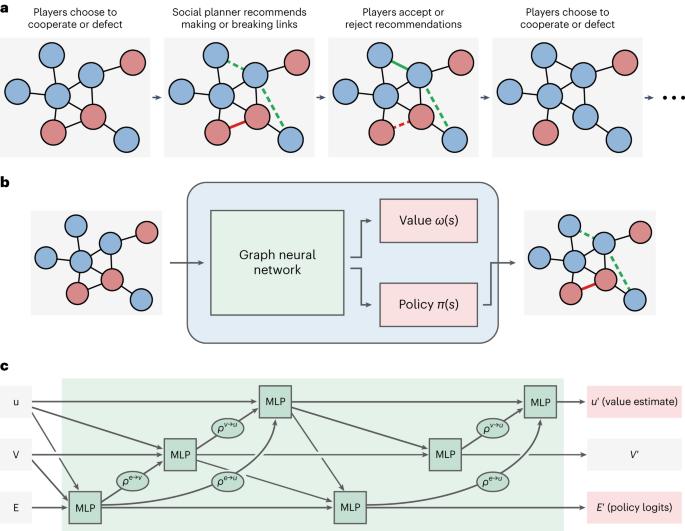Scaffolding cooperation in human groups with deep reinforcement learning
IF 21.4
1区 心理学
Q1 MULTIDISCIPLINARY SCIENCES
引用次数: 0
Abstract
Effective approaches to encouraging group cooperation are still an open challenge. Here we apply recent advances in deep learning to structure networks of human participants playing a group cooperation game. We leverage deep reinforcement learning and simulation methods to train a ‘social planner’ capable of making recommendations to create or break connections between group members. The strategy that it develops succeeds at encouraging pro-sociality in networks of human participants (N = 208 participants in 13 groups) playing for real monetary stakes. Under the social planner, groups finished the game with an average cooperation rate of 77.7%, compared with 42.8% in static networks (N = 176 in 11 groups). In contrast to prior strategies that separate defectors from cooperators (tested here with N = 384 in 24 groups), the social planner learns to take a conciliatory approach to defectors, encouraging them to act pro-socially by moving them to small highly cooperative neighbourhoods. McKee et al. show that deep reinforcement learning can be used to learn a new and effective strategy for encouraging mutually beneficial cooperation in a network game.

通过深度强化学习在人类群体中建立合作。
鼓励集团合作的有效方法仍然是一个悬而未决的挑战。在这里,我们将深度学习的最新进展应用于构建玩群体合作游戏的人类参与者的网络。我们利用深度强化学习和模拟方法来培训一名“社会规划师”,该规划师能够提出建议,在团队成员之间建立或打破联系。它制定的策略成功地鼓励了人类参与者网络中的亲社会性(N = 13组208名参与者)进行真实货币赌注的游戏。在社会规划师的指导下,小组完成游戏的平均合作率为77.7%,而在静态网络中为42.8%(N = 11组176例)。与之前将叛逃者与合作者区分开来的策略相反(在这里用N测试 = 24组384人),社会规划师学会了对叛逃者采取和解的方式,鼓励他们采取亲社会的行动,将他们转移到高度合作的小社区。
本文章由计算机程序翻译,如有差异,请以英文原文为准。
求助全文
约1分钟内获得全文
求助全文
来源期刊

Nature Human Behaviour
Psychology-Social Psychology
CiteScore
36.80
自引率
1.00%
发文量
227
期刊介绍:
Nature Human Behaviour is a journal that focuses on publishing research of outstanding significance into any aspect of human behavior.The research can cover various areas such as psychological, biological, and social bases of human behavior.It also includes the study of origins, development, and disorders related to human behavior.The primary aim of the journal is to increase the visibility of research in the field and enhance its societal reach and impact.
 求助内容:
求助内容: 应助结果提醒方式:
应助结果提醒方式:


